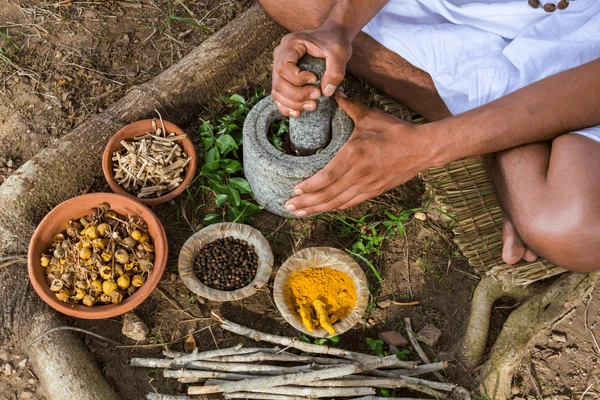
The multidimensional construction of Indian culture is represented by Ayurveda as the core element which originates from its life-giving source of olden wisdom. More than a mere medical system, Ayurveda holds a holistic vision of life with mind, body, and soul in enduring harmony through the ages.
Origins of Ayurveda: Encouraging Life Balance
Ayurveda meaning “science of life” which emerged from the Vedic era means more than 5000 years back. Stemming from the old scriptures called Vedas, the base concept of Ayurveda is the sustaining of an equilibrium of the basic elements of the body: Vata (air), Pitta (fire), and Kapha (ground).
The Five Elements and Doshas: Image for Health
At the core of one of the Ayurveda basic belief is one of the following: the universe islinked to humans or interconnectedness. The five elements – earth, water, fire, air, and ether – each in their own distinct proportion can also explain the distinct mind-body constitutions, sometimes called the doshas. Delving into one’s dosha is the key for stable wholesomeness.
Vata (Air and Ether): She rules over the sphere of movement and relates to dryness and lightness.
Pitta (Fire and Water): Ruling over the digestion and expressing like appetitive heat.
Kapha (Earth and Water): Runs a structure and stability and is identified as the qualities of heaviness and moisture.
Balancing Act: Ayurvedic Practices
Ayurveda is based on the individual approach to health, with special attention towards preventive methods. Diet, daily habits and herbal medicine work in synergy and result in perfect balance of doshas. Here are key aspects of Ayurvedic practices:Here are key aspects of Ayurvedic practices:
Dietary Harmony: The doshas define the foods categories to be used. For example, cool foods for pacifying Pitta and warm foods to balance Vata.
Yoga and Exercise: Curated exercise and yoga routines designed for each dosha ailment help in getting physical and mental stability.
Meditation and Mindfulness: The Ayurvedic tradition is proficient in the interrelation of the mind and body. In ascending to equilibrium in mind, practices similar to meditation and mindfulness are should be considered to the greatest possible extent.
Seasonal Awareness: Ayurveda recognizes the impact of the seasons on the three doshas that in turn prompts us to adjust our routines.
Modern Resurgence: Role of Ayurveda in the Modern Age
Nowadays, Ayurveda is regaining popularity worldwide as a holistic alternative to contemporary wisdom and the conventional methods. Wellness retreats and Ayurvedic spas, as well as herbal products, illustrate the fact that herbal medicine is still relevant.
Challenges and Future Prospects
However, even though Ayurveda has a very old tradition, it still has challenges with standardization and its integration with modern medicine. Although some disparity remain, joint research, global correspondences and acceptance activities have been pursued to reduce them.
Holistic Lifestyle Integration: In addition to medicine, the main objective of healthcare is to address the other needs of individuals in order to maintain a healthy lifestyle.
Ayurveda is more than the recipes, it also deals with the thoughts, habits, sleep patterns and the feelings of the human being.
Individualized Wellness Plans: Individual Experience
Each person`s Ayurvedic path can be different, which is why individualized wellness plans that address specific body types and imbalances in the Ayurveda model are given more enhancement.
Environmental Harmony: Being one with the Nature
Ayurveda calls for living in peace with nature, paying attention to the impact it has on the human health. This involves synchronization with natural internal rhythms, as well as variation in expenditure of energy based on seasonal requirements.
Mind-Body Connection: The Substance of Healing
At the core of Ayurveda is the fact that the mind and the body are two inseparable elements and thus they can act one upon the other. Memory health is a main pillar of the universal health approach.
Culinary Alchemy: Ayurvedic Cooking
In Ayurvedic diet, classical cooking methods that harness the distinct properties of ingredients are used to amplify foods’ individual dosha contributions.
In the dynamic spectrum of the Indian culture, the Ayurveda is that precious jewel that echoes with the heartbeat of life and the search for equilibrium in a fast changing world.









